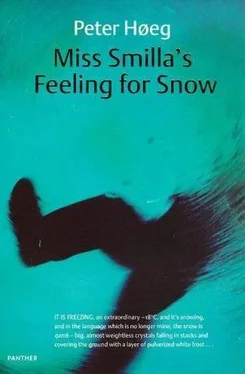Peter Høeg - Smilla's Sense of Snow aka Miss Smilla's Feeling for Snow
Здесь есть возможность читать онлайн «Peter Høeg - Smilla's Sense of Snow aka Miss Smilla's Feeling for Snow» весь текст электронной книги совершенно бесплатно (целиком полную версию без сокращений). В некоторых случаях можно слушать аудио, скачать через торрент в формате fb2 и присутствует краткое содержание. Жанр: Современная проза, на английском языке. Описание произведения, (предисловие) а так же отзывы посетителей доступны на портале библиотеки ЛибКат.
- Название:Smilla's Sense of Snow aka Miss Smilla's Feeling for Snow
- Автор:
- Жанр:
- Год:неизвестен
- ISBN:нет данных
- Рейтинг книги:3 / 5. Голосов: 1
-
Избранное:Добавить в избранное
- Отзывы:
-
Ваша оценка:
- 60
- 1
- 2
- 3
- 4
- 5
Smilla's Sense of Snow aka Miss Smilla's Feeling for Snow: краткое содержание, описание и аннотация
Предлагаем к чтению аннотацию, описание, краткое содержание или предисловие (зависит от того, что написал сам автор книги «Smilla's Sense of Snow aka Miss Smilla's Feeling for Snow»). Если вы не нашли необходимую информацию о книге — напишите в комментариях, мы постараемся отыскать её.
Smilla's Sense of Snow aka Miss Smilla's Feeling for Snow — читать онлайн бесплатно полную книгу (весь текст) целиком
Ниже представлен текст книги, разбитый по страницам. Система сохранения места последней прочитанной страницы, позволяет с удобством читать онлайн бесплатно книгу «Smilla's Sense of Snow aka Miss Smilla's Feeling for Snow», без необходимости каждый раз заново искать на чём Вы остановились. Поставьте закладку, и сможете в любой момент перейти на страницу, на которой закончили чтение.
Интервал:
Закладка:
He puts down his cigar. He hasn't really been enjoying it. "Then there's you, Smilla. I've sailed on lots of 4,000 ton ships. None of them ever had a cabin attendant. Certainly not one who acts like she's the Queen of Sheba."
I pick up his cigar and drop it in my bucket. It goes out with a little hiss.
"I'm cleaning up," I say.
"Why did he let you on board, Smilla?"
I don't give him an answer. I don't know what to say.
It's not until the door to the engine room shuts behind me that I realize how enervating the noise was. The silence is refreshing.
Verlaine, the bosun, is standing on the lowest platform, leaning against the wall. I involuntarily turn sideways as I go past him.
"Get lost?"
He pulls out a clump of rice from his breast pocket and puts it in his mouth. He doesn't drop a single grain, and nothing sticks to his hands; it's a purely automatic movement.
Maybe I should make up an excuse, but I hate being interrogated. "Just took a wrong turn."
Several steps up, I happen to remember something. "Mr. Bosun," I add. "Just took a wrong turn, Mr. Bosun."
3
I hit the alarm clock with the side of my hand. It shoots through the cabin like a projectile, slams against the hooks on the door, and drops to the floor.
I don't do well with phenomena that are supposed to last for life. Prison sentences, marriage contracts, lifetime appointments. They're attempts to pin down segments of life and exempt them from the passage of time. It's even worse with things that are supposed to last forever. Like my alarm clock. My "eternity clock." That's what they called it. I pried it out of the smashed instrument panel of the second NASA moon vehicle after it was totaled on the ice cap. The vehicle was as incapable as the Americans of withstanding minus 67°F and winds that went off the Beaufort scale.
They didn't notice that I took the clock. I took it as a souvenir, to prove that no everlasting flowers can survive in my company, that even the American space program couldn't survive three weeks with me.
The clock has lasted for ten years. Ten years in which it has received nothing but brutality and harsh words. But they expected great things from it back then. They said you could stick it in the flame of a blowtorch and boil it in sulfuric acid and sink it to the bottom of the Philippine Trench and it would keep time as if nothing had happened. This claim was a flagrant provocation for me. In Qaanaaq we thought that wristwatches were cute. Some of the hunters wore them for decoration. But we would never dream of being regulated by them.
That's what I told Gil, who was driving. (My job was to sit in the observation cockpit and report when the color of the firn got too dark or too white, which means that it won't hold but will open up, allowing the earth to swallow a 15-ton, idiotic American dream of reaching the moon, letting it fall into a 100-foot-deep, brilliantly blue-and-green crevasse, which narrows at the bottom and wedges everything that falls in into a tight embrace at minus 22°F.) In Qaanaaq we are guided by the weather, I told him. We are guided by the animals. By love. And death. Not by a piece of mechanized tin.
I was only in my early twenties. At that age you can lie -you can even lie to yourself-with greater self-confidence. In reality, European time had come to Greenland a long time ago, long before my birth. It came with the Greenland Trading Company's opening and closing times, payment schedules, church hours, and hourly wages.
I've tried pounding on the clock with a sheet-metal hammer. It made dents in the hammer. By now I've given up. Now I make do with knocking it onto the floor, where it lies, electronically beeping, unperturbed, saving me from showing up on the bridge without having splashed cold water on my face and put on eyeliner.
It's 2:30 a.m. It's the middle of the night in the Northern Atlantic Ocean. At 10:00 p.m., with no prior warning except a green wink of light, Lukas's voice had issued from the loudspeaker over my bed. Like an invasion of my little room.
"Jaspersen. At 3:00 a.m. we need coffee served on the bridge."
Not until the clock hits the floor does it emit any sound. I woke up on my own, awakened by a feeling of abnormal activity. Twenty-four hours is enough to make the ship's rhythm my own. A ship at sea is quiet at night. the engine thuds, of course, the long, high swells slosh against the side, and now and then the stern crushes a fifty-ton block of water into a fine powder of fluid. But those are normal sounds, and when sounds are repeated often enough, they become part of the silence. The watch is changed on the bridge, somewhere a ship's clock strikes. But the people are asleep.
Now there is commotion against this familiar backdrop. Boots in the corridor, doors slamming, voices, sounds on the loudspeaker, and a distant rumbling from hydraulic winches.
On my way up the stairs to the bridge, I stick my head out on deck. It's dark. I can hear footsteps and voices, but no light is on. I step out into the darkness.
I'm not wearing any outdoor clothes. The temperature is about freezing, the wind is blowing astern, the cloud cover is low and dense. The waves are visible only right next to the ship, but the troughs of the waves seem as long as a soccer field. The deck is slippery and slick with salt water. I duck under the sea rail to seek shelter and make myself as unobtrusive as possible. Near the tarp I pass a figure in the dark. Up ahead there is a faint light. It's coming from the cargo hold farthest forward. The hatches have been slid aside and a railing put up around the opening. Two wires extend through the opening from the two backward-facing cranes on the forward mast. Over the railing, both in front and in back, lies a heavy blue nylon hawser. There's no one in sight.
The cargo hold is surprisingly deep and illuminated by four fluorescent lights, one on each bulkhead. Thirty feet down, on the lid of a huge metal container, sits Verlaine. At each corner of the container is a white fiberglass holder, like the ones for inflatable life rafts.
That's all I manage to see. Someone grabs my clothes from behind.
I yield, not out of resignation, but to retaliate with even greater force. At that moment the ship rolls on an oblique swell, and we lose our balance and fall backward against the control panel for the winches, and I catch a scent of aftershave that I recognize.
"Idiot! You idiot!" Jakkelsen fights to catch his breath after his exertion. There's something in his face and voice that wasn't there before. The beginnings of fear.
"This ship is run like in the old days-you keep to your own area." He gives me an almost pleading look. "Beat it. Get lost."
I walk back. He half whispers, half shouts after me into the wind. "Do you want to end up in the big wet closet?"
The tray rams into one side of the door frame and then the other before I manage to get my bearings and stand there clattering in the dark room.
No one speaks to me. After a moment I push my way backward and find room for the cups and the pastry on the table among rulers and calipers.
"Two minutes, eight hundred yards."
He's merely an outline in the dark, but it's an outline that I haven't seen before. He's bending over the green digits of the electronic log.
The pastry dough smells of butter. Urs is a meticulous cook. The aroma is whisked away because the door is standing open. On the bridge wing, I can make out Sonne's back.
Above a sea chart, a faint red bulb is turned on, and Sigmund Lukas's face appears out of the darkness. "Five hundred yards."
The other man is wearing a coverall with the collar turned up. Next to him, on the navigation table, there is a flat box the size of a stereo amplifier. Two slender telescope antennas stick up out of the sides of the box. Nearby stands a woman, wearing the same kind of coverall as the man. Her long dark hair flowing loosely over her turned-up collar and curling down her back seems oddly out of place with her work clothes and air of concentration. It's Katja Claussen. Instinctively I know that the man is Seidenfaden.
Читать дальшеИнтервал:
Закладка:
Похожие книги на «Smilla's Sense of Snow aka Miss Smilla's Feeling for Snow»
Представляем Вашему вниманию похожие книги на «Smilla's Sense of Snow aka Miss Smilla's Feeling for Snow» списком для выбора. Мы отобрали схожую по названию и смыслу литературу в надежде предоставить читателям больше вариантов отыскать новые, интересные, ещё непрочитанные произведения.
Обсуждение, отзывы о книге «Smilla's Sense of Snow aka Miss Smilla's Feeling for Snow» и просто собственные мнения читателей. Оставьте ваши комментарии, напишите, что Вы думаете о произведении, его смысле или главных героях. Укажите что конкретно понравилось, а что нет, и почему Вы так считаете.




![Рута Шепетис - Ashes in the Snow [aka Between Shades of Gray]](/books/414915/ruta-shepetis-ashes-in-the-snow-aka-between-shades-thumb.webp)







